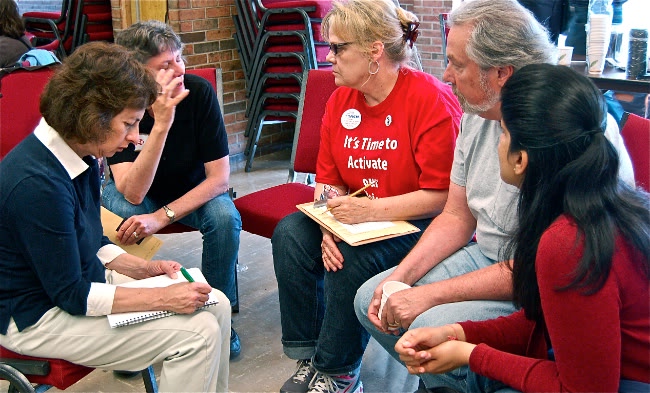3 ways to help you calm down in stressful conversations
It's not easy to stay calm and stay connected when things start to "heat up" in meetings, talks or ordinary conversations. We all have more or less experienced such a situation. Perhaps you have said something that makes you regret it later or feel stuck when trying to prove you right and ultimately cannot see a bigger picture. Perhaps, you have destroyed your belief in a deep relationship with your colleagues, customers, suppliers or husbands or children. And at those times, you only wish there was a "reset button" to do it all. In the face of these situations, how can we turn stressful conversations into constructive discussions?
Here are 3 tips to keep calm when you fall into such situations shared by author Amy Jen Su - co-founder and managing partner of Paravis Partners - a company that provides development programs. leadership and executive coaching for small business owners. In addition, she is co-author (along with Muriel Maignan Wilkins ) of the book Own the Room: Discover Your Signature Voice of Master's Leadership Presence.

1. Observe the critical points
When a lively, healthy debate is about to develop in a negative direction, the first thing is that you need to be aware of the signs that your emotions are about to "explode" . Only you know what happens in your mind to signal the "fight or run" action to be activated, otherwise known as "fight or flight" (in science, "fight"). or flight "explained that when stressed, the body will release hormones to prepare itself for a fight, one is to escape, two to fight until another loses." According to Amy Gallo , author of HBR Guide to Managing Conflict at Work , the best signal is the "physical response of the body." When the heart starts to feel threatened, the heart is beating fast, your face is hot and your breathing is more intense. " In terms of psychology when these symptoms appear, according to Gallo "the risk is not accessible to the frontal cortex (center of reasoning) and then, it will be very difficult to control yourself. each ".
Rick Juneja - senior vice president (Senior Vice President) of the Client Success department at Opower is currently leading a 145-person team that distributes software and services to global customers saying "When things go wrong After all, customers expect us to solve the problem quickly and this is not an easy job. Keeping calm is important. " Juneja encourages team members to monitor their reactions and changes in the response of other members. "If you see a person putting his or her weight on a certain part (arms / legs), crossing his arms in front of his chest or starting to ask questions in a rush, you may start to face In a serious situation, instead of trying to react to those behaviors, stay in your place . " Gallo agrees, "The phenomenon of emotional spread is real so once someone starts to feel hot, it is easy to make the opposite person too and maybe two people will start to enter into a fierce debate. ".
2. Focus on something tangible to calm down
Because the reactions are externally very powerful, bring the focus on the outward manifestations to keep calm. According to Gallo, first and foremost is breathing . "By performing deep breathing movements, you can focus on your body and limit reactions . " Use techniques 4 - 7 - 8 to get the fastest results, ie count from 1 to 4 to breathe in , hold your breath and count from 1 to 7 , then count from 1 to 8 to exhale . This is a breathing technique discovered by physicist and author of many health and medicine books, Dr. Andrew Weil , describes this technique as a "natural sedative therapy for nervous system " , helps you forget stressful thoughts and directs attention to calmness. Use it whenever something unpleasant happens before you react.

In addition to breathing, touching objects around you and feeling sensations is also an interesting solution. For example, according to Gallo, "put your hand on the table, feel your feet on the ground, pay attention to the legs that are stretched out on the chair and it is important not to think of being stuck in your head." You can also change your attention by looking at artworks on the wall or observing the size of the room or anything that helps you feel more about the size of the space. If you just feel that you need to "defend" yourself or put your weight on your legs, you will have everything around you very limited and always feel secret.
Changing your attention to something tangible will make it easier for you to assert your views in stressful debates. Remind yourself that the meeting is not to prove who is right, who is wrong or who is the smartest in the room but to solve the budget, find a reasonable price, give a difficult message with respect important or looking for a common solution. Do not become "prey" for others when trying to get everything towards you.
3. Empathy and creating bridges
A more objective view is that you can bring empathy (understanding and understanding what others say) into the conversation. Juneja regularly advised his group: "Let others show their grievances, make sure they feel what they say is always heard and relieved." Gallo also agrees with the affirmation: "What I often see in conflicts is that a person starts to get angry and others just want to speak up to dominate. Don't be like that, instead of pausing. praying for being right and focusing on listening will be better ".

Empathy does not mean agreeing, nor is it like giving in, being passive or allowing others to humiliate you. Realize that you are giving way to emotions that help you relax. By allowing others to vent, you will start connecting with important information to help bridge the gap between you and that person. Here are some illustrative examples of "bridges" that can lead you to more constructive solutions when the conversation becomes stressful.
Express your interest
Again, keep calm does not mean passive or concessions. In fact, others need to feel your interest in their problems through words or body language you use. Therefore, show your gesture behaviors to others so that they know that you are really paying attention and try to be with them. You can say the following: "I'm also disappointed with the things that happened here and feel the same sense of urgency as you do. Based on the facts we both know so far. then this is how we can move forward quickly. "
Admit mistakes
If after listening to someone else's point of view, you realize that the fact that you made a mistake assumes it. Instead of trying to defend, be straightforward. You can say: "I owe you an apology for your mistakes in communication. I only recognize the problem based on what you have shared. I have caused this problem for you and your team. Talk about how we can keep moving forward from here as well as how we can tighten the processes for the next collaboration. "

Find more information
In situations where others share information you never knew before, express your desire to learn more. You can say: "I was not aware of this. I wanted to look deeper", or you could say: "Maintain what you are doing, and both will learn more." believe and continue negotiations at 10 am tomorrow " .
Share more about the reasons
Use this technique as an opportunity to be more transparent. According to Juneja, "one of the biggest mistakes we often make is to be afraid to be transparent because we don't want to reveal too much about something. One of the great ways to regain faith is not to be afraid to do For yourself, it will help you prove to others that your opinion stems from reality. " You can say: "Now I have a better understanding of your concerns in decision making. Let me share with you more about the context, the difficulties and why I have been decided to do what I did ".

Communicate respectfully even in the face of disagreement
The fact that we do not always agree with our colleagues. However, disagreement is not synonymous with disrespectful attitude. Communicate with your commitment to relationships and acknowledge you appreciate others. Say things like: "I always value your reviews. While contemplating what you share, I realize that I don't feel comfortable with that direction. In the end, this is probably different. different views between us ".
So if the conversation becomes tense and you feel like you start losing your temper, take a deep breath, change your attention, show empathy and create "communication bridges". . Be responsible for mistakes, frankly apologize for your loss of control and respect for the opposite . While it is not possible to change what happened, we still have options to maintain peace with others and express our desire to compromise.